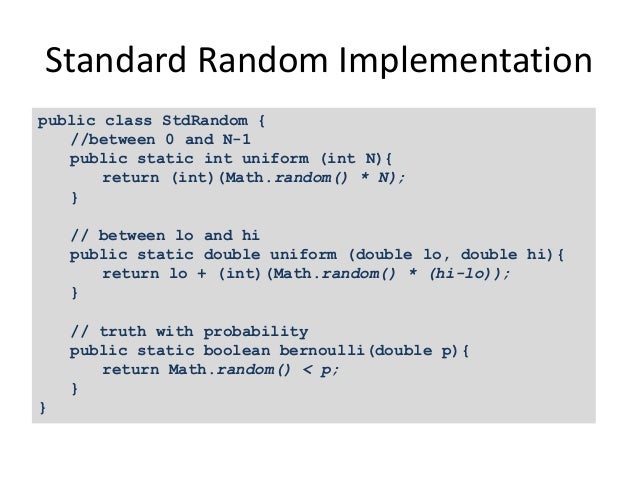
generating a Third random double number using Math.random()ĭouble mathRandomNumber3 = Math.random() ("Second number using Math.random() : " + mathRandomNumber1) generating a Second random double number using Math.random()ĭouble mathRandomNumber2 = Math.random() ("First number using Math.random() : " + mathRandomNumber1) genrating a first random double number using Math.random()ĭouble mathRandomNumber1 = Math.random() * java program to generate a random number using Math.random(). random() method returns a double value so always returned value will have decimal points. Math has random() method which is to generate a number between 0 and 1. All methods of Math class are static so you can use them directly with class name example Math.random(). When you've started learning a programming language such as c or java, first you have heard about Math API which has many mathematical utility methods such as min(), max(), ceil(), floor() methods. NextInt(5000): Generates a value in range 0 to 5000.Īnd also Random class has separate methods to generate double, boolean, float, long values and these methods are nextBoolean(), nextDouble(), nextFloat(), nextGaussian() for double and nextLong().ģ) Generating a random number using Math.random() NextInt(200): Generates a value in range 0 to 200. NextInt(100): Generates a value in range 0 to 100. Third random value with upper limit 5000: 3936 Second random value with upper limit 200: 144 ("Third random value with upper limit 5000: " + randomValue3) įirst random value with upper limit 100: 1 Int randomValue3 = random1.nextInt(5000) ("Second random value with upper limit 200: " + randomValue2) ("First random value with upper limit 100: " + randomValue1) Whenever you want to generate a random integer number by putting a restriction to upper limit. Please take a look at the below program that limits the upper bound to 100, 2. But if you want to limit the upper limit to certain value then it is possible by providing an int value to the nextInt(int limit) method. Here we have to note that nextInt() may return a positive or negative value. So that based on our three-class it has returned three different values. In the above program first created an instance for Random class named random1 and next called three times nextInt() method on random1 instance.

("Second random value: " + randomValue2) * java program to generate a integer random number using random.nextInt().

And all instances of Random class are thread-safe.įirst, you need to create an instance for Random class to use and next invoke nextInt() method to generate a random number.įirst, let us the example program to generate a random integer number. Random class is used to generate pseudo-random numbers in java. Random class is introduced in java 1.0 version as part of java.util package. The last one is introduced in JDK 1.7 which is for thread-based applications.Ģ) Creating a random number using Random.nextInt() In many scenarios, you might have seen using Math.random() or Random.nextInt() method.


 0 kommentar(er)
0 kommentar(er)
